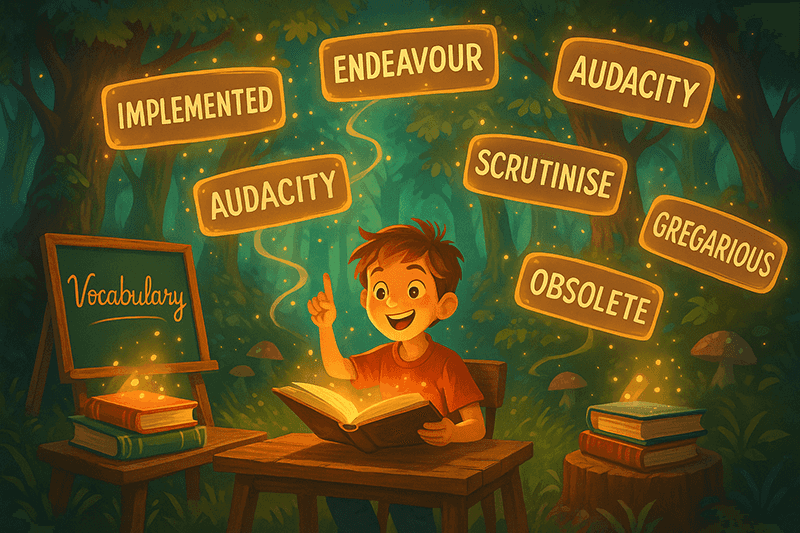A strong vocabulary is one of the biggest advantages a child can have when sitting the 11+ exam. It improves comprehension, boosts confidence in verbal reasoning sections, and makes creative writing more vivid and expressive. With hundreds of possible words to learn, it helps to start with high-impact words that frequently appear in 11+ practice material.
Here are 10 essential vocabulary words your child should know – including definitions, example sentences, and useful tips to help them remember and use each word.
1. Implore
- Meaning: To beg someone desperately and sincerely.
- Example: “He implored his teacher to give him one more day to finish the homework.”
- Tip: Think of it as stronger than just asking – it’s when someone is really pleading.
2. Endeavour
- Meaning: To try very hard to do something.
- Example: “She endeavoured to finish the puzzle before bedtime.”
- Tip: Often used in formal situations or writing – it’s a smarter way of saying ‘try’.
3. Audacity
- Meaning: Boldness or daring behaviour, sometimes in a disrespectful way.
- Example: “He had the audacity to speak back to the headteacher!”
- Tip: Can be positive (bravery) or negative (rudeness), depending on how it’s used.
4. Scrutinise
- Meaning: To examine something very carefully.
- Example: “The detective scrutinised the clues before making an arrest.”
- Tip: Use it instead of ‘look at’ to sound more precise and academic.
5. Complemented
- Meaning: To go well with something; to complete it in a good way.
- Example: “Her scarf complemented her dress perfectly.”
- Tip: Don’t confuse it with complimented, which means to say something nice.
6. Placid
- Meaning: Calm and peaceful; not easily upset or excited.
- Example: “The placid lake reflected the sky like a mirror.”
- Tip: A good word for describing settings in creative writing.
7. Gregarious
- Meaning: Very sociable; enjoying being with other people.
- Example: “He was a gregarious child who made friends easily.”
- Tip: Use it to describe people who love chatting and being in groups.
8. Obsolete
- Meaning: No longer used or needed; out of date.
- Example: “CD players have become almost obsolete now that we have streaming.”
- Tip: Try to use it in non-fiction writing to sound mature and precise.
9. Mitigate
- Meaning: To make something less severe or serious.
- Example: “Wearing a helmet can mitigate the risk of injury.”
- Tip: Often used in formal writing and exams – a good alternative to ‘reduce’.
10. Delude
- Meaning: To trick or mislead someone into believing something false.
- Example: “He deluded himself into thinking he would win without trying.”
- Tip: Related to 'illusion' – both involve false beliefs.
🧠 How to Learn These Words Effectively
- Make flashcards with the word on one side and the meaning + example on the other.
- Play games that involve synonyms, definitions, or sentence creation.
- Use the words in conversation – the more your child says them, the more they’ll remember.
📝 Practice Questions
Try these with your child:
- What is a synonym for “endeavour”?
- Create a sentence using the word “scrutinise.”
- Which word means “no longer useful or needed”?
- Is “audacity” always a good thing? Why or why not?
🎮 Learn Through Play
Vocabulary doesn’t have to be boring. Our interactive vocabulary game helps children see and use new words in fun ways – perfect for preparing for the 11+. Just wait until you start hearing their vocabulary improve!
Start your 14-day free trial today – no card required!
Let’s make learning words fun, effective, and stress-free.
